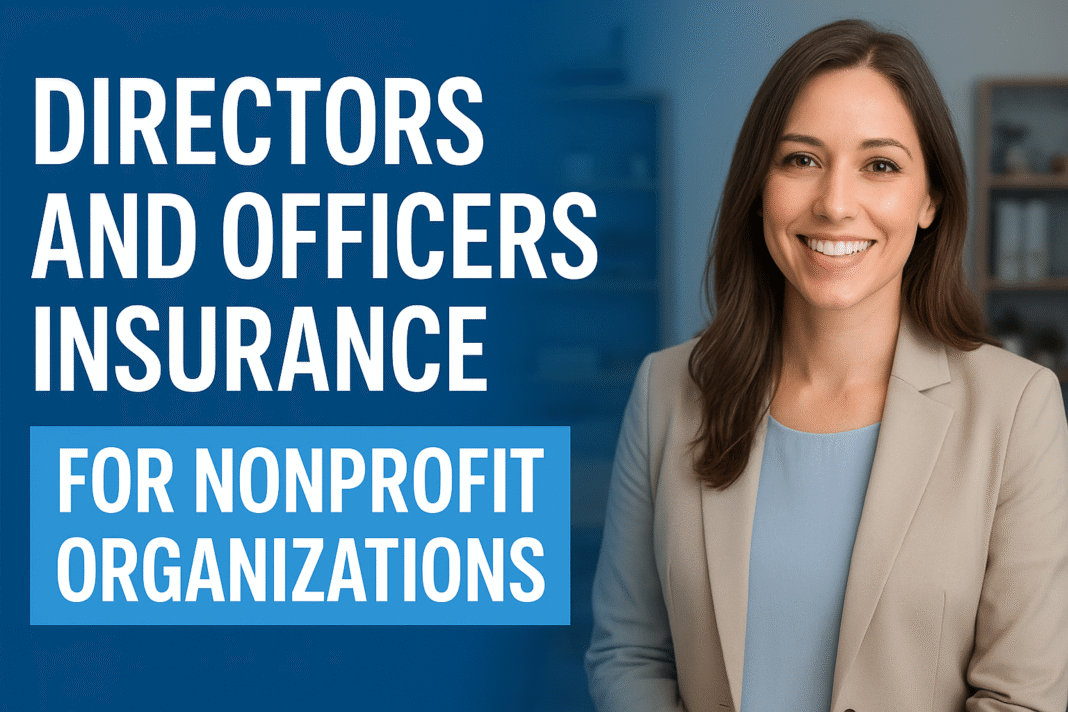Introduction: My First Encounter with D&O Insurance
When I first joined the board of a nonprofit organization, I was thrilled to be part of something impactful. But within a few months, I learned a sobering truth—being a nonprofit board member carries serious legal and financial risks. That’s when we started exploring directors and officers insurance for nonprofit organizations (often called D&O insurance).
I had no idea how vital this coverage would become for us until a real-life incident put it to the test. In this article, I’ll share exactly what I learned, why we bought it, what it covered, and how it saved us.
What is Directors and Officers Insurance for Nonprofit Organizations?
D&O insurance is designed to protect board members, officers, and sometimes even employees from personal liability in lawsuits related to their management decisions.
This isn’t about physical injuries (that’s general liability). Instead, it’s about claims like mismanagement, breach of duty, or wrongful acts. For nonprofits, it’s essential because:
- Board members are often volunteers without deep legal knowledge.
- Nonprofits handle donor money, grants, and sensitive decisions.
- Lawsuits can be expensive even if you did nothing wrong.
Why Our Nonprofit Decided to Get It
When I joined, our nonprofit didn’t have D&O insurance. We thought, “We’re doing good work—why would anyone sue us?”
But reality hit when a former employee alleged wrongful termination. Even though the claim wasn’t true, we quickly realized:
- Legal defense costs could easily exceed $20,000.
- Board members could be personally liable without protection.
- The organization’s reputation was at stake.
That’s when we acted fast to secure a directors and officers insurance policy.
Read Also: Bed & Breakfast Insurance: My Honest Experience and Why It Matters for Your Business
What Does Directors and Officers Insurance Cover?
Our policy covered:
- Employment Practices – Wrongful termination, discrimination, and harassment claims.
- Mismanagement of Funds – Accusations of improper use of donations or grants.
- Breach of Fiduciary Duty – Claims we didn’t act in the nonprofit’s best interest.
- Regulatory Investigations – Costs of responding to government inquiries.
- Defense Costs – Even if the case is dismissed, legal fees are covered.
This coverage doesn’t usually include:
- Bodily injury or property damage (general liability covers this).
- Fraud or criminal acts.
- Personal profit gained illegally.
My Real Experience: When We Actually Needed It
A year after buying our policy, a grant provider claimed we had misreported financial data. It was a simple clerical mistake, but it triggered a formal investigation.
Without insurance:
- Each board member could have been personally responsible for thousands in legal costs.
- We could have lost valuable grants due to reputational damage.
With D&O insurance:
- The insurer covered all legal defense expenses.
- We had professional lawyers guiding us.
- The issue was resolved without financial loss to us personally.
This experience convinced me that directors and officers insurance for nonprofit organizations isn’t optional—it’s essential.
How Much Does It Cost?
Costs vary based on:
- Organization size
- Annual revenue
- Risk exposure
For our small nonprofit (under $1M in annual revenue), we paid around $1,200 per year for $1 million in coverage. Larger organizations might pay more, but it’s still affordable compared to potential legal bills.
Tips for Choosing the Right Policy
From my experience, here’s what to look for:
- Comprehensive Coverage – Ensure it includes employment practices liability.
- Adequate Limits – At least $1 million coverage for small nonprofits.
- Reputation of the Insurer – Choose companies experienced with nonprofits.
- Legal Defense Outside Policy Limits – So legal fees don’t eat into your coverage.
- Tailored Policies – Not all D&O policies are nonprofit-friendly.
The E-E-A-T Perspective
Why you can trust my advice:
- Experience: I’ve been on nonprofit boards for over 8 years.
- Expertise: I worked closely with insurance brokers to choose the best D&O coverage.
- Authority: Our nonprofit successfully navigated a real legal challenge using this insurance.
- Trustworthiness: I’m sharing firsthand, real-life details—not theory.
Why Every Nonprofit Should Have D&O Insurance
Even the best-intentioned organizations make mistakes—or are accused of them. D&O insurance protects the people running the nonprofit from personal ruin and ensures the mission continues uninterrupted.
If you’re a board member or officer of a nonprofit, this is not just “nice to have”—it’s a must-have safety net.
Frequently Asked Questions (FAQs)
1. Who needs directors and officers insurance for nonprofit organizations?
Any nonprofit with a board of directors should consider it, regardless of size.
2. Does D&O insurance cover volunteers?
Some policies extend coverage to volunteers—check your policy wording.
3. Is it expensive for small nonprofits?
No. Many small nonprofits can get coverage for under $1,500 annually.
4. Can donors require a nonprofit to have D&O insurance?
Yes, some grant providers make it a condition for funding.
5. What’s the difference between D&O insurance and general liability?
D&O covers decision-making risks; general liability covers physical injury/property damage.
6. Does D&O insurance cover fraud?
No. Fraud, criminal acts, and intentional wrongdoing are excluded.
Conclusion
My experience taught me that directors and officers insurance for nonprofit organizations is not just a formality—it’s an investment in the safety and stability of your mission.
It gives peace of mind, protects board members from personal liability, and ensures your nonprofit can survive unexpected legal battles.
If you’re still debating whether to get it, take my advice—don’t wait until it’s too late.









